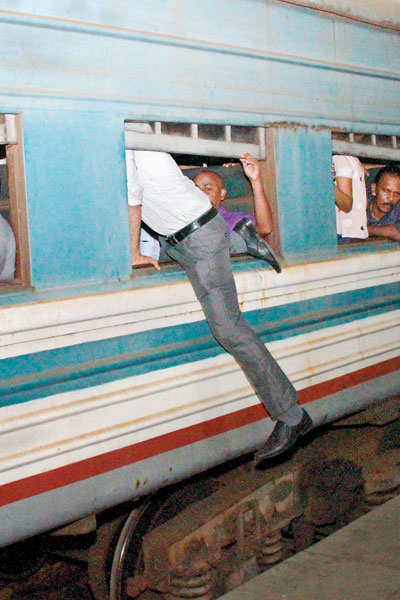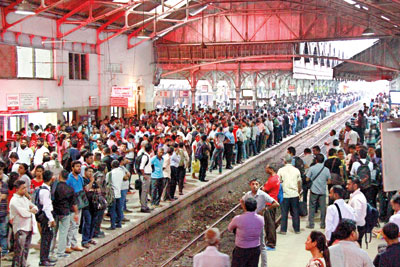News
Train services normal, unions hopeful of positive response from cabinet committee
View(s):Train services yesterday had virtually returned to normal after a week-long strike, but railway unions said they were awaiting a positive response to the demands for the railway to be made a ‘closed service’ for a speeedy solutions for issues relating salary anomalies, pay increases and promotions.

Office employees had to travel in overcrowded trains and were often late to work
Locomotive Operating Engineers Union (LOEU) President Lal Paranawithana said they returned to work on Wednesday after ending their seven day strike in view of the assurances given by a cabinet committee.
He said the cabinet committee headed by Minister Sarath Amunugama and including Ministers Rajitha Senaratne and Akila Viraj Kariyawasam agreed to make the railway service a ‘closed one’ similar to the education and health services.
He said the cabinet committee gave a written assurance that the issue would be sorted out while also assuring them that no action would be taken against those who went on strike.
Mr. Amunugama had told them the committee would meet again next week for more discussion.
The union leader said they had met Minister Amunugama on Friday and he reassured them that no action would be taken against the strikers.
He claimed that the Railways Department authorities were taking disciplinary action against the strikers for some incident that occurred earlier.
“We don’t want to go on strike. We are prepared to continue train services even after te GCE ordinary level examination ends next week, if our demands are met,” he said.
The union leader, referring to salary anomalies, said earlier that there were as many as 132 salary scales, but the previous regime had reduced the number to 34. From 2006, they had requested the authorities to rectify this, but it had not been done, until they took union action last week. During the railway strike, hundreds of thousands of people were seriously affected and students sitting the GCE O/L exam found it difficult to get to their centres on time. Some students were seen at bus stands as early as 5 a.m.
Office employees said they had to travel in overloaded buses and were often late for work due to extra traffic congestion because more people were using private vehicles.
During the strike two or three trains operated, but often the Fort railway station, generally bustling with commuters, was seen to be empty.
Unions representing engine drivers, station masters, guards, supervisors, gatekeepers and others joined the strike and continued it though President Maithripala Sirisena on December 6 declared the railway services as essential.

During the railway strike, hundreds of thousands of people were seriously affected. Pix by Indika Handuwala

